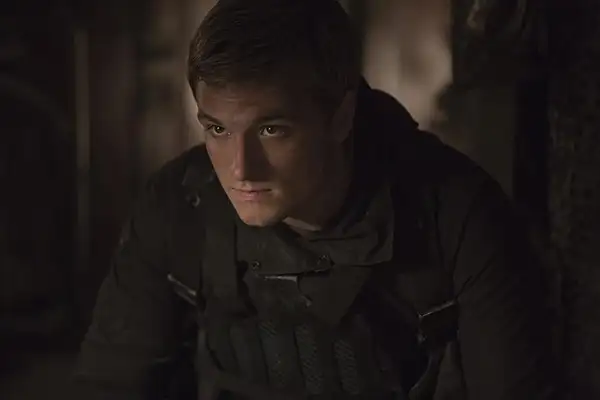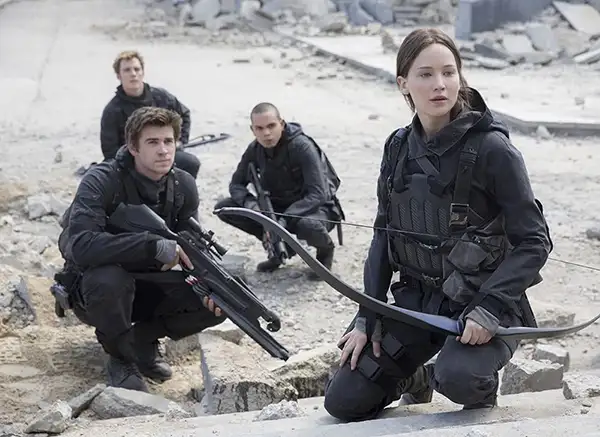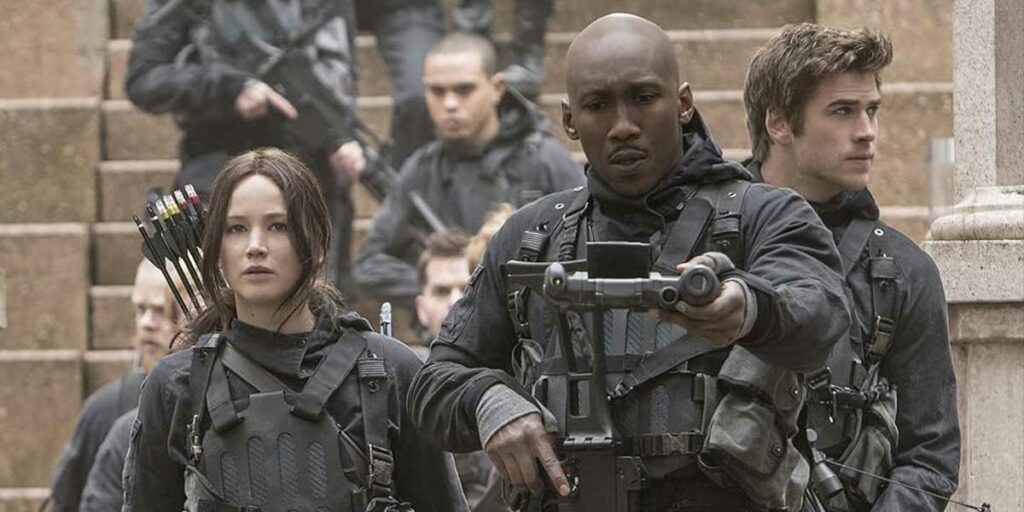With stellar performances, direction, and surprises, The Hunger Games: Mockingjay Part 2 wraps up its original film series on a subversive, bittersweet note.
The Hunger Games: Mockingjay Part 2 was released in 2015 and, if my ability to count hasn’t wavered, is the follow-up to Mockingjay Part 1 that came out the year prior. Katniss Everdeen (Jennifer Lawrence) is physically and emotionally recovering from an attack by her friend Peeta Mellark (Josh Hutcherson), who was brainwashed by the Capitol ruling over the country of Panem. Meanwhile, with a revolution underway, Katniss joins the Star Squad to infiltrate the Capitol and assassinate President Snow (Donald Sutherland). Under the orders of the rebellion’s President Coin (Julianne Moore), the team faces one death trap after another, as well as their own inner conflicts as the politics within the revolution come to a shocking head.
What’s interesting about Mockingjay Part 2 is how it’s similar in many ways to Part 1 but also quite different. I even refrained from bringing up certain points when discussing Part 1 so I’d have more to talk about with Part 2. Part 2 definitely feels like a more “complete” story on its own than Part 1, just by virtue of its structure and more major developments that happen here, but it also clearly requires Part 1 to be as fulfilling as it is. The film contains noticeably more action than Part 1, but it has the same slow direction and pacing that still classify it as more of a thriller than anything else. Even the bulk of the wide-scale war going on isn’t shown as we instead follow the stealthier mission of Katniss and company. But once again, I find this a more interesting approach that emphasizes how much these films are about the subterfuge and manipulation of war, rather than the adrenaline-fueled action of war.
In the case of Part 2, the central heart is the drama within the Star Squad, particularly between Katniss and Peeta. Josh Hutcherson gives his best performance in the whole series as a heavily damaged, conflicted, and recovering victim. His slow return to the Peeta that we knew before is constantly marred by the looming threat of his brainwashing taking over and his own tainted memory of what’s real. Even if the dialogue describing his state of constant uncertainty wasn’t so potent (which it is), his shaky, dour expressions would be all you’d need to feel what’s going on in his mind. Maybe Hutcherson was tapping into the trauma of being in Firehouse Dog, I don’t know. Lawrence plays opposite him perfectly as she tries to maintain some semblance of idealism towards her friend and whether or not she can keep protecting him.
The only downside to this relationship is something that persists through every Hunger Games movie: I totally buy that Katniss and Peeta are dear friends who would do anything for each other, but I don’t buy that they’re in love with each other. Any time their romantic drama is brought up, it feels totally obligatory because their chemistry and body language just don’t match up with what they’re saying, which is so weird because of how great their performances otherwise are. I feel the same way towards the romance between Katniss and her other close friend Gale (Liam Hemsworth). In fact, the love triangle between these three has always been the weakest part of the series to me. With how much is going on that’s of much greater interest, the love triangle feels very trivial, especially with how insincerely it comes across.

Much like Catching Fire, Mockingjay Part 2 is at its best when it really looks at the shifting alliances and deception going on within both the Capitol and the rebellion, and simply good when it pushes that aside for some more intense action. Which is to say, I love the first act of Mockingjay Part 2 where the stage is being set and people are trying to feel out what this final mission is really about, and the third act where everyone’s cards are finally clear and game-changing turns are taken … and I like the more straightforward mission in the middle.
If the mission is treated as this film’s “Hunger Games,” it’s my favorite of the Hunger Games because of the drama with Peeta and the underlying tension in where the war’s endgame is going. The action sequences are very well-done, with Francis Lawrence’s direction finding the perfect middle ground where the shots are shaky enough for intense realism but framed well enough for us to make everything out. We’re a long way from the more intrusive shaky cam of the first Hunger Games, where giving viewers migraines is apparently all you need to show children getting slaughtered without getting an R rating.
A sequence in the middle involving mutated “mutts” is my favorite bit of action in the whole series. I remember being blown away by the effects on the creatures back in 2015, and while they’ve aged a bit, they still look great because Jo Willems’s cinematography shoots and lights them in a way that helps them blend in with the environment and puts you right there in the chaos. This clearly wasn’t just a case of, “Shoot on some green-screen, insert CGI in post, underpay the effects artists, the end.” The violent splashing of water, vicious struggles, and shaky but coherent camerawork sell the illusion, and the CGI itself is mostly really solid in its own right.
Sequences that would be portrayed in a “fun” or more traditionally “entertaining” manner in other films maintain that same grittiness in Mockingjay Part 2. I took this for granted at the time, but it’s something I love about all these movies now. So many blockbusters and spectacle-driven films nowadays feel the need to inject levity just for the sake of it. Mockingjay Part 2, like its predecessors, plays almost everything deadly seriously. There are humorous moments, but that’s all they are: moments. And even then, they’re more witty than laugh-out-loud funny. A lot of films can and have thrived with comedy, and comedy can even be the most ideal choice in some cases, but it’s so refreshing to go back and see a film series trust in its own material and embrace the gravity that its characters should be feeling.
I also adore how Mockingjay Part 2 ends. This film, along with the other three, has been building up a grand, epic, explosive final battle where nothing more is held back. Almost any other film would deliver on that, but Mockingjay Part 2 again skirts expectations with a portrayal of and outcome to the fight that’s very jarring, depressing, and empty, intentionally so. It cements, more than anything else in these movies, just how blurry the line between allies and enemies truly is, and it’s outright cruel in how it completely undoes the main motivation Katniss had for getting involved in any of this from the very start.

After that, the surprises just keep coming. Suspicions that most of us probably had since the start of Mockingjay Part 1 are confirmed here, and we’re once again given a new, unsettling reminder of how even a supposedly good cause could be potentially serving a different kind of evil. I again think back to all of the cults that form around politicians and entertainers, and how often it’s just suckers following obvious manipulators. In Mockingjay Part 2, we see more clearly than ever how not only blinding this can be, but also how it leads to vicious cycles that keep terrible systems intact. Even if different people end up in charge, inherent corruption doesn’t die and is in fact helped by the distractions of conflict.
Like all of these films, Mockingjay Part 2 feels so much more relevant now than ever. The United States had already been deeply divided in the political arena in 2015, largely by the extreme minds that have made nuance and understanding increasingly rare commodities. Not only has this gotten worse in the years since, but we’ve also seen the rise of culture wars in the entertainment industry that exploit those who are just looking for some cause or belief to latch onto, oblivious to how mutually destructive such infighting is. Mockingjay Part 2 asks us to break that cycle in a cleverly staged climactic sequence where Katniss finally takes full and total agency over the direction she wants her life and her country to go. I felt it coming as soon as the scene started, and I was so satisfied when my gut was proven right.
God, could you imagine what would’ve happened had these films come out now? How many times “woke” or “anti-male” or “KeEp Ur PoLiTiKz OuT!” would’ve been regurgitated online when talking about the series? Ugh, I’d rather play the Hunger Games myself than live in that timeline.
While Mockingjay Part 2 isn’t the most consistently intellectual film in the Hunger Games series, it has so many of the best scenes, character arcs, and helpings of commentary, and it ends the story in just about the most perfect way I could have imagined. It’s not a completely jovial final note, but it has enough optimism to make us hope for better days for this fictional realm. Every death is powerful and earned because every character leaves a meaningful impression. Every twist and turn keeps you uncertain of reality and more distrusting of institutions both in the film and in our own world.
Francis Lawrence’s tantalizingly patient direction, Jo Willems’s impeccably precise cinematography, James Newton Howard’s downplayed but eerie score, and the performances of every single actor (including Phillip Seymour Hoffman in his final role), make The Hunger Games: Mockingjay Part 2 a great ending to a great series. None of these films are masterpieces, but they all have so much to offer narratively and cinematically, and they shouldn’t be taken for granted. Lawrence’s return to the director’s chair for the upcoming prequel makes me hopeful that the franchise will maintain its winning record. But even if it doesn’t, Lawrence, the other Lawrence, and everyone involved should be proud of what they did here.
The Hunger Games: Mockingjay Part 1 is now available to watch on digital and on demand. Read our review of The Hunger Games: The Ballad of Songbirds and Snakes.

